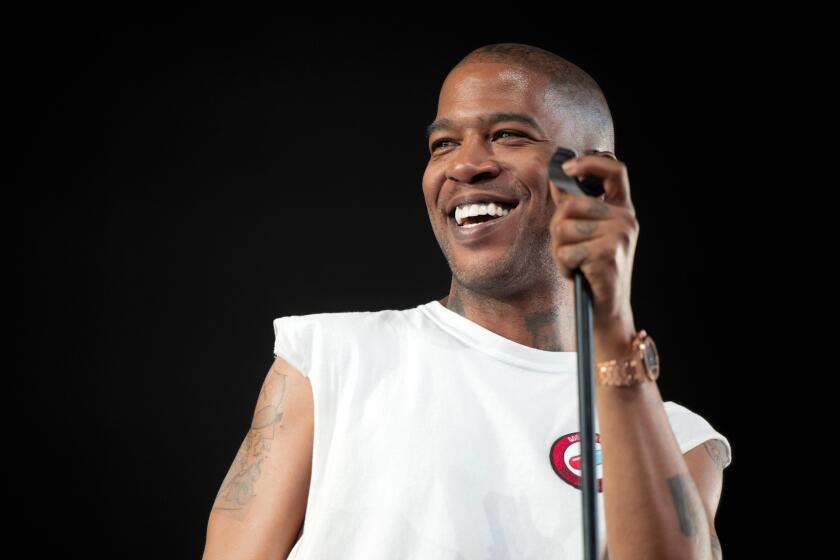There’s plenty cookin’
More than a half century after his death, Hank Williams remains so revered as a songwriter that his gifts as a singer are often underappreciated. But one of the strengths of “The Unreleased Recordings,” a remarkable new CD boxed set released today, is the way it showcases the brilliance of his vocal skills.
Besides his singing prowess, the three-disc package, which features 54 radio show performances, also underscores Williams’ musical influences, including his affinity for gospel songs and his playful personality.
Williams was the hottest artist in country music in 1951 when he agreed to host a 15-minute radio show for WSM, the Nashville station that broadcast the Grand Ole Opry. Because he toured so much, Williams taped the shows in advance with his Drifting Cowboys band at the WSM studio. The shows were then aired at 7:15 a.m. weekdays.
Listening to the set, it’s clear that Williams could have been an influential figure in country music even if he had never written a song. His phrasing in this relaxed setting sometimes exhibits a stronger and more personal edge than he showed during his more formal recording sessions.
Although many boxed sets are so filled with hits and misses that they deserve to be called little more than record industry “product,” this set is so rich and revealing it deserves to be labeled “historic.”
--
Hank Williams
“The Unreleased Recordings”
(Time Life)
he back story: Lots of country music performers in the 1940s and 1950s hosted local radio shows, and Williams was just 27 when he signed on to WSM. He already had such No. 1 country singles as “Lovesick Blues,” and “Long Gone Lonesome Blues” behind him. In 1951, he added two more No. 1 country singles to his string: “Cold, Cold Heart,” which became a pop smash after Tony Bennett recorded it, and “Hey, Good Lookin’,” a playful tune with an opening line that went, “Hey, hey, good lookin’, whatcha got cookin’?/ How’s about cookin’ somethin’ up with me?”
His early time slot might not sound impressive, but it was a prized one, especially in rural areas reached by the powerful station. In the set, Williams’ daughter, Jett, writes about his early morning listeners.
“Imagine that it’s 7:15 a.m. in January, 1951,” she writes. “People are cooking biscuits, milking cows, driving to work or doing whatever they did on a daily basis, and they’re treated to a 15-minute radio show starring Hank Williams.” She continues, “He talked about his favorite songs, where he’d been and where he was going. Whatever came into his head. It was kinda like having him join you at your breakfast table for a good visit.”
It’s that casual format that helps makes these recordings so engaging. We get a glimpse of Williams’ humor on the first disc when he introduces “Hey, Good Lookin’ ” by slipping in his sponsor’s name, “If you’ve got anything cookin’, just be sure you’re cookin’ it with Mother’s Best flour.” He then adds, “Well, I ain’t good lookin’, but I’m gonna to start cookin’,” before starting the song.
Later he tells his band members that his grandmother taught him a version of “On Top of Old Smokey” that was a lot different from the Weavers’ singalong rendition that topped the pop hit parade early in 1951.
“Remember that thing?” he asks someone in the studio. “I’m going to get the boys and see if we can do it like the old, old-timers used to do.” His version is much slower and more deliberate than the Weavers’ treatment.
The music: Although Williams sang a few of his songs, including “I Can’t Help It (If I’m Still in Love With You),” he mostly performed material on the show by other writers, including such country standards as Fred Rose’s “Blue Eyes Crying in the Rain,” which Willie Nelson redid so successfully in 1975, and Scotty Wiseman’s “Have I Told You Lately That I Love You,” which had been a hit for both Gene Autry and Tex Ritter.
Williams devoted a lot of time to gospel music, including Thomas A. Dorsey’s classic “Precious Lord, Take My Hand” and Will Thompson’s “Softly and Tenderly,” which was later recorded by Elvis Presley and Johnny Cash.
Whatever the material, Williams sang with such passion and care that he made any composition feel like it was his own. The most remarkable moment in the set is probably his version of “Cool Water,” the Bob Nolan tale of isolation and faith. Unlike the jaunty treatment the song often gets, Williams sang it with such a dark sense of loneliness that his version becomes unforgettable.
--
Backtracking is a monthly column focusing on CD reissues and other pop items of historical interest.
More to Read
The biggest entertainment stories
Get our big stories about Hollywood, film, television, music, arts, culture and more right in your inbox as soon as they publish.
You may occasionally receive promotional content from the Los Angeles Times.






